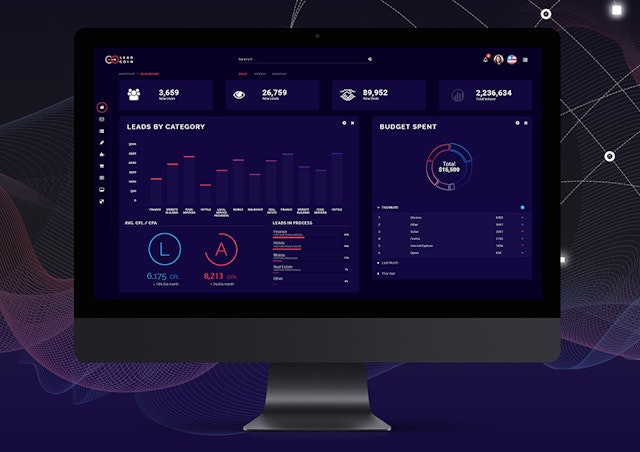Blockchain takes on ad fraud and the Google-Facebook duopoly
Cryptocurrencies are beginning to smell a lot like tulips. Still no one I know in the world wanted or received a virtual reality headset for a holiday present last month. Everyone continuously waits for the flying cars that we were promised in early science fiction.

High-tech fads come and go, and the best inventions never arrive at all. But there is one innovation that has real potential in the marketing world of 2018: blockchain.
Two recent events have bolstered the technology. In late 2017, the WPP-owned agency Mindshare announced a partnership with blockchain protocol Zilliqa to address privacy and fake news issues in advertising. Earlier this month, Kodak released the KodakOne platform, which uses a blockchain to create a digital ledger of rights ownership for photographers – news that more than tripled the the company’s stock price following the announcement.
And the possibilities only start there.
What is blockchain?
Most advances in marketing technology are simply one of two things: either a new type of direct response that targets people with some type of electronic junk mail or an artificial intelligence technology that does low-level sales or customer service.
Most buzzwords either mean nothing precise, are absolutely useless, or both. ‘Millennials’ refers to a demographic that is precise but not typically useful in marketing. ‘Content marketing’ simply refers to marketing communications and, as a term, it can be useful, but it is never discussed in a precise way. AI is at best misunderstood or at worst wrongly mentioned to get publicity when a technology does not actually use it.
Blockchain, on the other hand, is a buzzword that is actually a real advancement and refers to something both precise and potentially useful. Blockchain is different because it is a fundamental restructuring of the way that marketing operations – or anything else – can occur online.

A blockchain, the technology on which cryptocurrencies such as Bitcoin are based, is a decentralised and shared digital ledger with a continuously updated list of transactions across a fully distributed or peer-to-peer network. A blockchain can be public or private as well as have its own currency or medium of exchange. Ethereum is one of the most popular platforms for blockchain-based projects and startups.
In basic terms, Blockchain is like a gigantic Google spreadsheet in the cloud. Whenever someone in the network makes a transaction and “edits” the ledger, everyone else verifies the change and sees the updated ledger. No other party – such as a government, bank, or financial institution – is needed.
Here is the basic idea:
- John and Jennifer are anonymous members of a specific 10-person blockchain network
- John pays Jennifer $1,000 for some given transaction
- John and Jennifer update their ledger balances to show John loses $1,000 and Jennifer gains $1,000
- Everyone else on the network verifies the transaction, and then the ledger updates
- Each transaction is a ‘block” within the sequential “chain” of the ledger in a similar way as an accountant would go down through each line in a company’s books
Now, just imagine the same example – but the networks consist of 500 or 5 million people. That is blockchain.

If someone wants to advertise through Google or Facebook, then that person must work within a centralised platform that is owned and dictated by those companies. But if a group of people want to buy, sell, or trade something among themselves – whether it is Bitcoin or something else such as marketing leads – then blockchain technology can help to facilitate that.
"Blockchain is a technology that, for me, finally solves the tragedy of commons," Maksim Izmalov, chief executive of Winding Tree, a blockchain-based travel distribution platform, said. "For the first time in human history, we have the technology that allows us to build systems that aren't owned or controlled by a corporation or an individual – however benevolent they may be – but by the the community that uses those systems."
Examples of blockchain in marketing
In alphabetical order, here are some of the prominent blockchain startups and companies in the marketing world:
- AdChain – an open protocol on the public Ethereum blockchain that helps people to build decentralized digital advertising applications
- AdEX – a decentralised ad network based on blockchain and smart contracts technology
- Basic Attention Token – a token that can be exchanged between publishers, advertisers, and users on the Ethereum blockchain
- Bitclave – a decentralised search engine powered by blockchain that compensates users rather than advertisers
- Indahash – an influencer tech platform that launched a cryptocurrency in late 2017 with which brands can pay influencers
- KR8OS – a marketing analytics and attribution platform build on blockchain
- LeadCoin – a blockchain network that allows companies to sell unused leads to others
- MadHive – a decentralised ad network built on blockchain and a platform for data exchange and collaboration
- Mavin – a microinfluencer network that is due to launch its own blockchain coin in the coming weeks
- MetaX – a company that builds blockchain-based protocols and decentralised applications for the digital advertisers and publishers
- Papyrus – is a decentralised online advertising ecosystem that uses blockchain and aims to improve the programmatic advertising industry
- Provenance – is using blockchain to help producers, suppliers, and retailers to track and monitor supply chains
- Status – a decentralised mobile operating system with built-in chat and wallet functionality
- Truth – a media agency built on blockchain technology and run by The Marketing Group that promises advertisers full transparency
Battling the status quo
Back in the days of Bill Clinton and Cool Britannia, the internet was a chaotic wild west with no one really in charge. Today, however, almost everything that we experience online is influenced – if not outright controlled – by Amazon, Apple, Facebook or Google.
In the digital advertising world, Google and Facebook accounted for 73% of the US market late last year. It is critical that competitors enter the market to dissuade the two from any monopolistic behaviours, and some of the blockchain companies see themselves doing just that.
"LeadCoin is bringing a core disruption to web marketing, presenting a powerful alternative to the duopoly of Google and Facebook," the company’s founder, Shmulik Grizim, said. He founded LeadCoin and his three prior companies in the so-called Startup Nation of Israel, where the VC fund iAngels, led by co-founders Mor Assia and Shelly Hod Moyal, has focused on investing in blockchain.
Longtime readers of this column know that I think ad tech and programmatic advertising have led to little more than fraud, wasted money, and the creepy tracking of consumers. Blockchain’s proponents think that the platform can solve those problems as well.
"We observed the issues afflicting digital advertising such as ad fraud, ad blocking, and lack of transparency and believe that blockchain can address these issues, something that we wish to demonstrate with our prototype," Papyrus business development advisor George Odysseos said.
"Decentralised, blockchain-based models will make ad exchanges and ad buying more fluid and transparent," Indahash chief growth officer Joanna Pawluk said. "The possibility to create much better targeting and verification using blockchain will only speed up the process."
KR8OS co-founder Sam Goldberg even thinks that blockchain can transform all digital marketing.
"With an accurate record of data, it is foreseeable that a day will come when all marketing resembles a fine-tuned machine rather than throwing a lot at the wall and seeing what sticks," he said. "This type of open attribution platform introduces something sorely lacking in advertising today: a fully transparent and fraud-protected system that advertisers can leverage to better understand where customers are coming from."
But it might be only hype
Of course, the founders of blockchain companies are chasing millions of dollars and will always say that the technology is the best thing since strawberries and cream at Wimbledon. Others, such as Saleem Khan, global leader in data innovation at analytics company Dun & Bradstreet, are more skeptical.
"Blockchain is currently a solution in search of a problem in the marketing space," he said. "The issue here is not that blockchain doesn’t add value, it’s that the martech and adtech space has not had a demonstrated success with it yet."
According to those inside and outside the industry, two of the specific problems with blockchain are processing speed and past intrusions into blockchain-powered platforms such as cryptocurrencies.
"There are scalability and performance limitations," Odysseos said. "For instance, Bitcoin and Ethereum can only process up to 15 transactions per second. Visa processes thousands."
"Many ICOs have failed due to cybersecurity issues because of hacks and denial of service attacks leading towards the theft of cryptocurrency," Harman Singh, co-founder of niche cybersecurity company Defendza, said. "All of this boils down to due diligence at the start of business concepts and not paying enough attention to the amount of risks posed due to lack of cyber hygiene."
At two conferences in October 2017, I predicted that this year’s forthcoming EU GDPR regulation will severely harm the martech world by mandating that companies can no longer collect or use the data of any consumers in the region without their explicit, opt-in consent.
According to Smartpipe chief executive and co-founder Tobin Ireland, some people wrongly think that blockchain is a simple solution to the problems that GDPR poses for marketers. Smartpipe, a mobile data monetisation company, has created a GDPR-compliant solution for mobile network operators.
"Blockchain is often wrongly labelled an 'anonymous technology', which would place it outside of the scope of data protection law, when in fact it uses identifiers that can only be considered as personal information," Ireland said. "Unique hashed IDs are used consistently across multiple transactions, so data subjects can be singled out. Also, re-identification is possible. There have been 'intruder studies' that have shown it is possible to link the hashed IDs to people using IP addresses associated with blockchain entries."
For me, security is the biggest issue. Nothing on the internet or in the cloud – which is just a buzzword for using someone else’s servers – is completely impenetrable. Everything can be hacked. I do not understand why we still store anything important or sensitive online. One day, a blockchain will be hacked, and there will be disastrous consequences. It is only a matter of time.
As I read in an anonymous comment in the online forum Fark.com: "There is nothing wrong with the theory of blockchain, but it involves a lot of varied interests all deciding to play together for the interest of everyone."
Still, every trend will always reach absurd excesses. Zach Bloom, an engineering manager at Cloudflare, tweeted a blockchain advertisement that he saw for Bananacoin last week that was, quite literally, bananas:

Is ‘blockchain’ really blockchain?
Among journalists of any type, the publicity tactic that results in the most eye rolling is when people slap a buzzword on any and every product – especially when the item in question does not actually use whatever is being hyped. In 2017, you could search Google for ‘AI-powered’ or ‘uses artificial intelligence’ to see numerous examples. I predict that 2018 will see the same thing in the context of blockchain.
According to marketing and blockchain analyst Sara Simeone, those who use blockchain can also see whether another company that claims to use the platform is actually doing so.
"Since most of the new tech is built on Ethereum, transactions are visible in the ledger by anyone already operating in this space, such as B2B users," she said. "Users can check their transactions by simply searching for their token address or token transaction on sites such as Etherscan.io and Etherchain.org. It will take much more time for this level of interest to form amongst everyday users not already adopting the new technology."
‘The future of the internet’
Whether any given company is actually using blockchain, the technology’s advocates foresee an internet that will return to the wild west days of the 1990s.
"Distributed tech, including blockchain, is the future of the internet," StJohn Deakins, founder and chief executive of CitizenMe, a decentralised data platform that empowers people with their personal information, said. "The digital world is atomising with value, and power is being distributed back to us all as individuals. A physically shared record of transactions is an obvious evolution."
The Promotion Fix is an exclusive biweekly column for The Drum contributed by global marketing and technology keynote speaker Samuel Scott, a former journalist and director of marketing in the high-tech industry. Follow him on Twitter and Facebook. Scott is based out of Tel Aviv, Israel.

